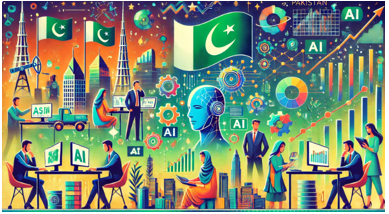INP-WealthPk
Ayesha Saba
Pakistan needs to accelerate AI adoption and workforce reskilling to remain regionally competitive. These efforts align with the E-Pakistan Vision, which aims to transform the country into a knowledge-based economy.

Without swift action, Pakistan risks falling behind regional leaders, who are rapidly advancing AI-driven innovation and growth.
During an interview with WealthPK, Shoaib Khan, a researcher analyst at Sustainable Development Policy Institute, said that AI is no longer a futuristic concept — it is a present-day reality that is reshaping industries globally. He noted that while countries like India, China, and Malaysia have already made considerable strides in leveraging AI for manufacturing, healthcare, and public services, Pakistan remains in the early stages of its digital transition.
He stressed that the modern era is driven by artificial intelligence and cutting-edge technology, and Pakistan must align itself with this global pace. “The world has advanced rapidly. We must embrace the change as this is now an urgent national requirement,” he said.
Shoaib emphasised that although Pakistan has a demographic advantage with nearly 64% of its population under the age of 30, the majority lack exposure to digital tools and future-oriented skills. “The youth bulge must be transformed into a digitally competent workforce. It is imperative that AI literacy be introduced at the school level and expanded through higher education and professional training,” he said.
He remarked that E-Pakistan Vision is a critical step toward economic modernisation, but it must be backed by timely investments in digital infrastructure, AI capabilities, and an enabling policy environment. “Without these, we risk falling behind regional economies that are already leveraging AI to drive growth and innovation.”
Bilal Siddiqui, a tech entrepreneur, underscored the importance of public-private partnerships to scale digital innovation as the government cannot bring about this change alone. “The private sector must play an active role in shaping AI strategies, offering internships, and collaborating with academia.”
He also recommended the establishment of AI centres of excellence, public-private innovation clusters, and targeted incentives for businesses investing in AI-driven solutions. “These measures would not only boost productivity and service delivery but also reduce youth unemployment and curb the outflow of skilled professionals,” he added.
Siddiqui highlighted that infrastructure gaps and digital inequality are also identified as major hurdles to achieving the E-Pakistan Vision. “Many rural areas still lack basic internet access, which limits participation in the digital economy.”
Credit: INP-WealthPk













